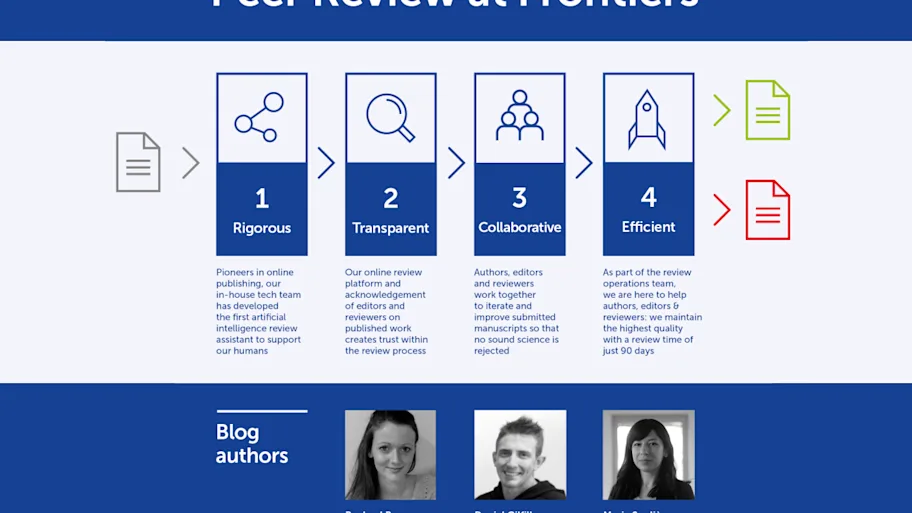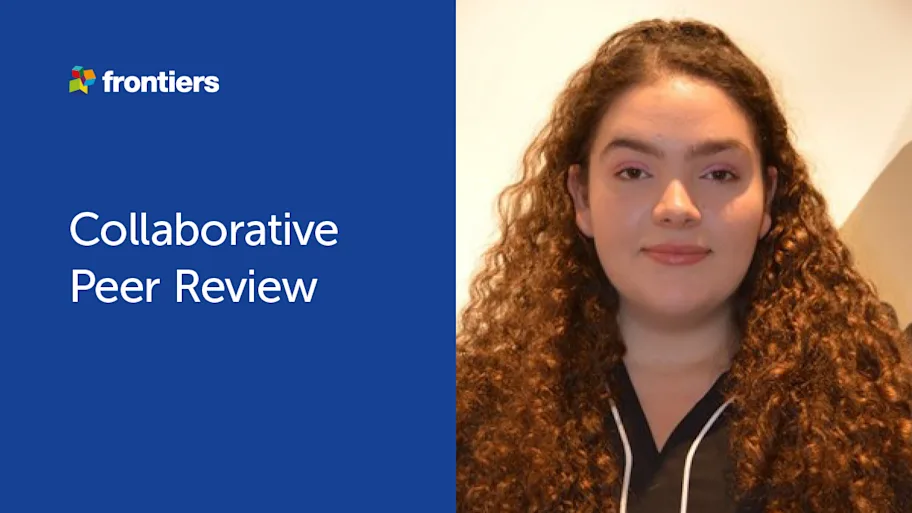
- Science news
- Frontiers news
- Competing interests in Peer Review: The importance of transparency
Competing interests in Peer Review: The importance of transparency

— by Ben Dickinson and Marie Soulière
Frontiers is committed to fair, rigorous, and transparent peer review. Transparency is the central theme of Peer Review Week 2017, so we take this opportunity to highlight how we raise the standard for transparency in peer review, with the support of our policies on competing interests.
Transparency at the core of our processes
Frontiers was founded in 2007 with the principles of openness and transparency at its core, and as pioneers of a more open peer review, we are passionate about the benefits that this approach delivers.
Our peer review is performed by external experts, currently over 70’000 researchers from leading institutions worldwide, according to clearly defined review guidelines. During the peer review process, the authors’ identities are known to editors and reviewers, and on publication, every article is accompanied with the names and full online profiles of the handling editor and the reviewers who endorsed the manuscript. The profiles are discoverable on our research network, Loop, and enable readers to browse the academic record of everybody involved in the manuscript publication – from authors to reviewers. This transparent approach has powerful benefits:
it publicly acknowledges and credits the editor and reviewers for their contributions;
It introduces a chain of accountability into the review process;
it increases the visibility of the authors, editors and reviewers as well as their previous work, and collaborations.
What is a competing interest? |
A competing interest exists wherever an individual could be affected or perceived to be affected in their ability to perform a role objectively. Commercial funding or commercial affiliations, for example, may be perceived to have compromised the ability of an author to conduct an unbiased study. Likewise, an editor or reviewer may be unable to provide an objective assessment of a manuscript if a personal relationship influences them, such as a shared affiliation with the author(s). Frontiers follows the for competing interests (often called ‘conflicts of interest’). |
|
How can transparency affect competing interests?
Transparency also raises the bar for a more rigorous review process. By being transparent about the identities of our reviewers and editors, we ensure complete accountability and remove the potential for undiscovered competing interests. This ensures the integrity of our journals, benefitting our authors, editors, and reviewers, and it also safeguards the quality of the published content. Frontiers journals continue to grow in impact and citation leadership, thanks to their solid foundation of transparency, accountability and quality.
Our commitment to transparent disclosure necessitates a very rigorous approach to peer review checks, to eliminate potential competing interests at the outset. We have a number of verification processes that are performed by our in-house staff, and we also enhance these with automated software processes, custom-built by Frontiers for this purpose. For example, we use our Research network Loop profiles and affiliation database to detect shared institutions.
Being transparent means also that we need to dedicate great effort to ensure a highly rigorous review process, once our checks have ensured the reviewer assignments are correct. We have a dedicated in-house team who handles the peer review process of every manuscript, and a suite of digital tools which enable us to handle ever-increasing volumes of submissions at a consistently high quality standard. One critical tool is our custom-build and constantly evolving Digital Editorial Office, which alerts our team, as well as Chief Editors to tasks that require their attention and allows easy monitoring of manuscripts.
Frontiers’ policies on competing interests
The question of what constitutes a competing interest is by no means clearly defined. There are some situations where it would never be appropriate for an editor or reviewer to handle a manuscript, but there are others where an objective assessment of the manuscript can still be provided despite an affiliation or relationship that may need to be disclosed.
It is paramount to establish clear and transparent criteria on what constitutes a competing or conflicting interest, in which circumstances alternative reviewers/editors need to be sought, and in which cases disclosures need to be made.
All of our reviewers and editors are required to complete a competing interests questionnaire prior to handling a manuscript, and if a potential conflict is identified, our staff verify whether it would be appropriate for them to handle the manuscript. In cases where the review can proceed, the manuscript will be accompanied by a competing interests disclosure statement to inform readers that whilst a potential conflict was identified, a fair and objective assessment of the manuscript could still be provided. Our handling Editors will then ensure that all review reports are balanced, and additional reviewers will be invited if any concerns are identified. Our internal staff also verify every manuscript prior to acceptance to ensure the integrity of the peer review.
A summary of our current policies for competing interests between editors/reviewers and authors is presented in the table below.
Potential conflict between editors/reviewers and authors | Acceptability |
Family or close personal friends. | Never acceptable |
Current collaborations | An ongoing collaboration is never acceptable. Collaboration in the past 3 years are manually verified. If the collaboration presents a low risk of potential bias, the editor/reviewer can continue with an accompanying disclosure statement |
Supervisor/advisor relationships | Ongoing supervisory relationships are never acceptable. Collaborations in the past 3 years are manually verified and accompanied with a disclosure on publication. The same is true for a student/subordinate relationship. |
Shared affiliations | Generally not acceptable, except in the case of a large institution, and where no other conflicts exist. If a shared affiliation is permitted, a disclosure will accompany the publication. |
Financial interests with the authors, related businesses, or the content of the manuscript | Never acceptable |
Maintaining the integrity of review
Other models of peer review, such as double-blind review, offer a different approach to combating potential competing interests by ensuring that reviewers and editors do not know the identities of the authors. Whilst this is indeed a useful method of addressing this issue, it is very difficult to ensure that the authors remain truly anonymous. Even when great care is taken to remove all potentially identifying aspects, their identities can often be determined by the contents of the manuscript.
At Frontiers, we take the opposite stance: we disclose the editor and reviewers’ identities after peer review, instead of seeking to hide authors’ identities during. This transparent approach empowers reviewers to take full credit for their contribution. But the openness and extra scrutiny also safeguard the quality of our peer review and result in exceptional citation metrics.






